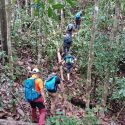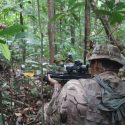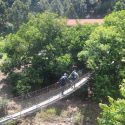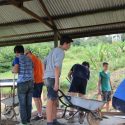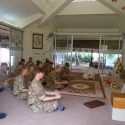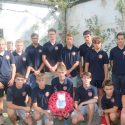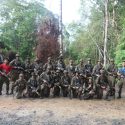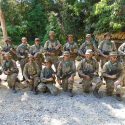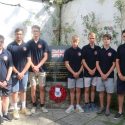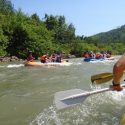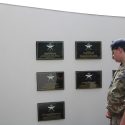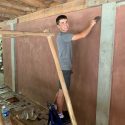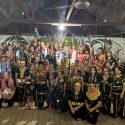On 3rd July sixteen cadets and three staff left Heathrow for the experience of a lifetime – jungle warfare training with the Gurkhas, walking the Death March and making a lasting impression on a remote village in Malaysia.
Our jungle experience started with learning how to survive – the essentials of food, traps, medicine, shelter and water. This included eating live bugs! The nights in the jungle were filled with strange noises, stories of wild boar circling the camp and the reflection of animals eyes as well as torrential downpours to test the bashas. The cadets engaged in CTR, contact drills, patrolling and navigation. The jungle phase ended with a camp attack through dense undergrowth.
Cadets learnt valuable skills about personal administration, observation, leadership, self reliance as well as overcoming personal fears of bugs. The difference in the cadets from the first tentative steps on day 1 in the jungle to the confident individuals who left the jungle is amazing to see and something they can carry forward into everyday life.
The second phase was in Malaysia and involved marching part of the Sandakan – Ranau death march. In 1945 a series of forced marches from Sandakan to Ranau took place. Over 2,371 Allied prisoners took part, only six survived. There were 641 British POWs involved, all who died. We took part in four days of the ten day march, navigating and trekking through thick jungle, crossing rivers and climbing hills; grateful that unlike the original prisoners, we had clothing, shoes, food and a comfortable place to sleep each night. The trek included a final push up Quailey’s Hill in Sabah, dedicated to Alan Quailey who was killed at the top of the hill. We visited Zudin’s platform – a viewing location that looked out over the dense jungle that the prisoners walked through and put into perspective our minimal efforts.
The end of the trek included a visit to Jungle Camp Number 1 at Ranau and to Jungle Camp Number 2 – “the last camp” – where the last surviving POWs were killed, 12 days after the end of the war.
We held a Service of Remembrance at Kundasang War Memorial to all those who died, especially the British Army and RAF who gave their lives.
The next phase was community. We feel it is important to give something back to the local communities that we visit. We stayed at Tenom and assisted a local village rebuilding a community centre so that their history, culture and tradition has a focal point and will carry on. The welcome, the hospitality, the food – memories and friendships created that will last for a lifetime. Beyond that, the act of community – giving something to the village that will be of use to them – making a difference.
Having spent a long time fighting our way through the jungle, the emotional death march and service, helping the community, it was time for some R&R to finish the trip.
We returned to the UK, exhausted but having had the experience of a lifetime having gained confidence, leadership and knowing that we made a difference. The cadets had gained skills but also an insight into themselves – their limits, their tenacity, their ability to face obstacles and overcome them. Their limits of what they thought they could do against what they actually could achieve were pushed and new boundaries established.
Without the support of The Ulysses Trust, Royal Air Force Charity Trust (RAFCT).and 2RGR these activities could not have taken place for which Sutton Valence School CCF are extremely thankful.
The Ulysses Trust also wish to thank the generosity of the Royal Air Force Charitable Trust for supporting this expedition. www.rafct.com

